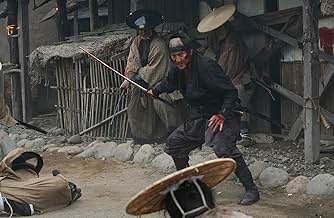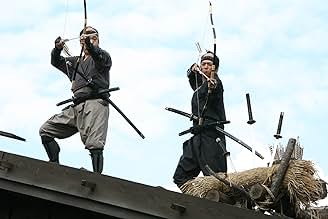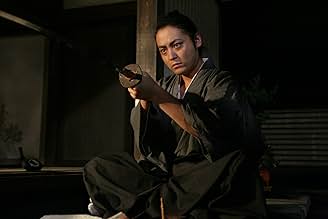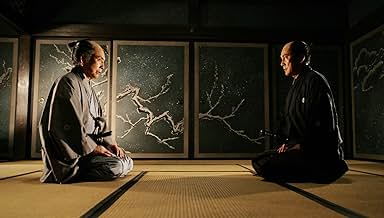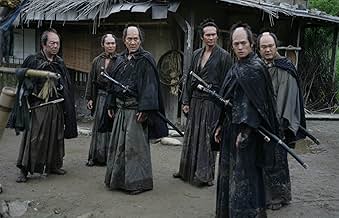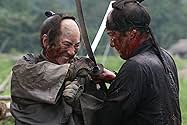CALIFICACIÓN DE IMDb
7.5/10
70 k
TU CALIFICACIÓN
Un grupo de asesinos se unen para una misión suicida para matar a un señor malvado.Un grupo de asesinos se unen para una misión suicida para matar a un señor malvado.Un grupo de asesinos se unen para una misión suicida para matar a un señor malvado.
- Dirección
- Guionistas
- Elenco
- Premios
- 15 premios ganados y 28 nominaciones en total
- Dirección
- Guionistas
- Todo el elenco y el equipo
- Producción, taquilla y más en IMDbPro
Opiniones destacadas
In 1844, the peace of the Feudal Japan is threatened by the cruel Lord Naritsugu Matsudaira (Gorô Inagaki) that is politically rising and getting closer to his half-brother, the shogun. After the harakiri of Namiya clan leader, the samurai Shinzaemon Shimada (Kôji Yakusho) is summoned by the shogun's adviser Sir Doi (Mikijiro Hira) of the Akash Clan to listen to the tragedy of Makino Uneme ((Takumi Saitô), whose son and daughter-in-law have been murdered by Naritsugu. Then Sir Doi shows a woman with arms, legs and tongue severed by Naritsugu and she writes with her forearm a request to Shinza to slaughter Naritsugu and his samurais.
Shinza promises to kill Naritsugu and he gathers eleven other samurais and plots a plan to attack Naritsugu in his trip back to the Akash land. But the cunning samurai Hanbei Kitou (Masachika Ichimura) that is responsible for the security of his master foresees Shinza's intent. Shinza decides to go with his samurais through the mountain, where they find the hunter Koyata (Yûsuke Iseya) that guides them off the mountain and joins the group. Now the thirteen men prepare an ambush to Naritsugu and his army of two hundred samurais in a suicide mission to stop evil.
"Jûsan-nin no shikaku", a.k.a, "13 Assassins", is a future classic of the samurai genre by Takashi Miike. It is inevitable to compare this film with Akira Kurosawa's "Seven Samurais" and the epic "The 300 Spartans", but "13 Assassins" is among the best samurais movies I have ever seen, with a solid story in the Edo period of Japan, stunning cinematography, wonderful performances and fantastic choreography in the battle scenes. My vote is nine.
Title (Brazil): "13 Assassinos" ("13 Assassins")
Shinza promises to kill Naritsugu and he gathers eleven other samurais and plots a plan to attack Naritsugu in his trip back to the Akash land. But the cunning samurai Hanbei Kitou (Masachika Ichimura) that is responsible for the security of his master foresees Shinza's intent. Shinza decides to go with his samurais through the mountain, where they find the hunter Koyata (Yûsuke Iseya) that guides them off the mountain and joins the group. Now the thirteen men prepare an ambush to Naritsugu and his army of two hundred samurais in a suicide mission to stop evil.
"Jûsan-nin no shikaku", a.k.a, "13 Assassins", is a future classic of the samurai genre by Takashi Miike. It is inevitable to compare this film with Akira Kurosawa's "Seven Samurais" and the epic "The 300 Spartans", but "13 Assassins" is among the best samurais movies I have ever seen, with a solid story in the Edo period of Japan, stunning cinematography, wonderful performances and fantastic choreography in the battle scenes. My vote is nine.
Title (Brazil): "13 Assassinos" ("13 Assassins")
This film was a dark-edged delight from beginning to end when I saw it at the 2010 edition of TIFF. The audience there loved it too, breaking out into spontaneous applause during several scenes.
Solid direction by Miike, great characters, beautifully shot and simply some of the best and most intense action sequences put on film - ever! It does have it's obvious influences, such as Kurosawa's "Seven Samurai", but damn, this one kicks ass mightily! You've never seen Shogun like this! And something else to point out: the sound on this film was thundering, shaking and stellar! THIS is the kind of film that reminds us why we go to a movie theatre to enjoy a film on a big screen, why we turn off our cell phones and immerse ourselves in the experience of cinema-going, as opposed to staying home on our couches.
I'll go see it again on the big screen when it hopefully returns to town - you can bet on that!
Solid direction by Miike, great characters, beautifully shot and simply some of the best and most intense action sequences put on film - ever! It does have it's obvious influences, such as Kurosawa's "Seven Samurai", but damn, this one kicks ass mightily! You've never seen Shogun like this! And something else to point out: the sound on this film was thundering, shaking and stellar! THIS is the kind of film that reminds us why we go to a movie theatre to enjoy a film on a big screen, why we turn off our cell phones and immerse ourselves in the experience of cinema-going, as opposed to staying home on our couches.
I'll go see it again on the big screen when it hopefully returns to town - you can bet on that!
"Thirteen. The time has come to lay down your lives for the greater cause. Are you ready?"
13 Assassins is all about the payoff. And the payoff comes in the form of 50 minutes of absolute carnage at the end of the movie. The story is about 13 warriors, some of the last truly capable samurai at a time when the era of those legendary soldiers was coming to an end, who band together to kill a despicable, deranged and utterly evil lord who is step-brother and future heir to the ruling shogun. Greatly outnumbered, the men devise a plan to force Lord Naritsugu and his guards to a village that they've prepared as what can only be called as a deathtrap.
If you liked the "Crazy 88's" fight from Kill Bill Volume 1 or the massive battle at the end of Azumi, then the epic showdown at the end of 13 Assassins automatically makes this a must see. But what about the preceding half of the movie? Most of that time is spent introducing us to the 13 assassins, Sir Hanbei - the noble but loyal to a fault man who is in charge of Lord Naritsugu's safety, and making us hate (and I mean REALLY hate) the lord himself. This portion of the movie was necessary to setup finale, but it was understandably not as exciting or captivating as the lengthy battle it precedes.
Rest assured though, the storytelling doesn't stop when the action begins. Some action scenes in movies can be so endless that they become monotonous (and boring, as a result), but 13 Assassins neatly avoids that trap by including character development until the very end.
This is a brutal, visceral movie, from the sadism of Lord Naritsugu to the blood-soaked, frenetic finale. If that sounds like something you'd be interested in, I heartily recommend that you give it a shot.
13 Assassins is all about the payoff. And the payoff comes in the form of 50 minutes of absolute carnage at the end of the movie. The story is about 13 warriors, some of the last truly capable samurai at a time when the era of those legendary soldiers was coming to an end, who band together to kill a despicable, deranged and utterly evil lord who is step-brother and future heir to the ruling shogun. Greatly outnumbered, the men devise a plan to force Lord Naritsugu and his guards to a village that they've prepared as what can only be called as a deathtrap.
If you liked the "Crazy 88's" fight from Kill Bill Volume 1 or the massive battle at the end of Azumi, then the epic showdown at the end of 13 Assassins automatically makes this a must see. But what about the preceding half of the movie? Most of that time is spent introducing us to the 13 assassins, Sir Hanbei - the noble but loyal to a fault man who is in charge of Lord Naritsugu's safety, and making us hate (and I mean REALLY hate) the lord himself. This portion of the movie was necessary to setup finale, but it was understandably not as exciting or captivating as the lengthy battle it precedes.
Rest assured though, the storytelling doesn't stop when the action begins. Some action scenes in movies can be so endless that they become monotonous (and boring, as a result), but 13 Assassins neatly avoids that trap by including character development until the very end.
This is a brutal, visceral movie, from the sadism of Lord Naritsugu to the blood-soaked, frenetic finale. If that sounds like something you'd be interested in, I heartily recommend that you give it a shot.
This is an epic masterpiece and is clearly a cut above most films in direction, acting, and cinematography. But what really sets it apart is that it connects the viewer to Bushido and has those values firmly at its core.
The sadistic tyrant who must be assassinated or Japan will turn once more to feudal warfare is told with verve and elan, but also with real dignity and a great sense of pace. The first hour is simply superb as we watch the recruiting and planning of the assassins. The second hour is a maelstrom of action with katanas flashing and impossible odds. I actually preferred the first half in the main, but absolutely no complaints with the action either.
All in all, this is simply, by far and away, the best action film of 2011 so far, but putting in a genre does not do it justice - for this reviewer, it is the most complete cinematic experience since Winter's Bone and is that rare animal these days - a film that looks, feels, and produces the sensation of film rather than TV.
Probably one of the better films (Japanese or otherwise) I have seen this decade without exaggeration - it actually attempts to embody Bushido and understand the meaning and purpose of the Shogunate and the Samurai - plus Katanas - oh yes - lots and lots of katanas.....
The sadistic tyrant who must be assassinated or Japan will turn once more to feudal warfare is told with verve and elan, but also with real dignity and a great sense of pace. The first hour is simply superb as we watch the recruiting and planning of the assassins. The second hour is a maelstrom of action with katanas flashing and impossible odds. I actually preferred the first half in the main, but absolutely no complaints with the action either.
All in all, this is simply, by far and away, the best action film of 2011 so far, but putting in a genre does not do it justice - for this reviewer, it is the most complete cinematic experience since Winter's Bone and is that rare animal these days - a film that looks, feels, and produces the sensation of film rather than TV.
Probably one of the better films (Japanese or otherwise) I have seen this decade without exaggeration - it actually attempts to embody Bushido and understand the meaning and purpose of the Shogunate and the Samurai - plus Katanas - oh yes - lots and lots of katanas.....
I'm a little wary of films from Takashi Miike as, although they are generally received as good, my experience of them has been that they are bloody and very odd. Thirteen Assassins though seemed a bit more accessible in terms of being more straightforward, which in some ways then makes the violence a little easier to watch. The plot here sees the amoral behaviour of Lord Naritsugu infuriate a small group of men who, led by veteran samurai Shinzaemon, set out to trap him and his 100+ entourage of guards (led by samurai Hanbei) in order to kill him and end his rise to power for the greater good.
This plot essentially cuts the film in half. The first half of the film is the setup and is mostly dialogue driven. It is slow and patient but not dull as the main thing it does is to turn the main character (and the audience) against Naritsugu by virtue of the terrible things he has done. This is brutal and quite shocking in regards some of the things we see, half-see or view the aftermath of. At the same time it gives us some time to get to know the thirteen main characters; although there is an air of honour to all of them, the characters do have traits of humour, weakness, anger and so on, which mark them out but also add some colour to the telling. The second half of the film begins when the trap is sprung and a small village becomes a contained killing field soon to be filled with bodies and blood.
I had wondered how I would find this because there was always the potential that action involving this size of a crowd would just be a mess of flailing and blood and that it wouldn't have any tension or flow to it. To a certain extent, this is a bit of a problem at times but mostly Miike overcomes it by splitting up the characters across the village and mixing smaller conflicts with bigger ones. You do still need to buy the sight of tired individual men cutting through a stream of 20 men but the narrative sort of makes this easy (it is a time of peace with a lower standard of samurai) but also it isn't all this type of action. It is bloody but without being overly gory for the sake of it. The delivery manages to make me believe the concept of the honourable death (not something I do normally) because of how dishonourable Naritsugu is and how likable Shinzaemon is throughout. The cast do well in this regard not only to make characters but also to remain distinguishable in the midst of the chaos and blood. Yakusho is strong in the lead and he contrasts well with Ichimura and Inagaki well; both of whom are also good even if Inagaki has a bit of an open goal in regards doing a simple amoral character. The supporting cast are good and mix their characters well with my favourite being Iseya who is fun and funny even if what his character represents sort of doesn't work for my western viewpoint.
Overall though, Thirteen Assassins is an engaging film that has good build-up which explodes into chaos and violence for the second half. I don't think it is perfect but in fairness some of the problems I had with it came with the plot and the territory, so they are not failings so much as just part of the film.
This plot essentially cuts the film in half. The first half of the film is the setup and is mostly dialogue driven. It is slow and patient but not dull as the main thing it does is to turn the main character (and the audience) against Naritsugu by virtue of the terrible things he has done. This is brutal and quite shocking in regards some of the things we see, half-see or view the aftermath of. At the same time it gives us some time to get to know the thirteen main characters; although there is an air of honour to all of them, the characters do have traits of humour, weakness, anger and so on, which mark them out but also add some colour to the telling. The second half of the film begins when the trap is sprung and a small village becomes a contained killing field soon to be filled with bodies and blood.
I had wondered how I would find this because there was always the potential that action involving this size of a crowd would just be a mess of flailing and blood and that it wouldn't have any tension or flow to it. To a certain extent, this is a bit of a problem at times but mostly Miike overcomes it by splitting up the characters across the village and mixing smaller conflicts with bigger ones. You do still need to buy the sight of tired individual men cutting through a stream of 20 men but the narrative sort of makes this easy (it is a time of peace with a lower standard of samurai) but also it isn't all this type of action. It is bloody but without being overly gory for the sake of it. The delivery manages to make me believe the concept of the honourable death (not something I do normally) because of how dishonourable Naritsugu is and how likable Shinzaemon is throughout. The cast do well in this regard not only to make characters but also to remain distinguishable in the midst of the chaos and blood. Yakusho is strong in the lead and he contrasts well with Ichimura and Inagaki well; both of whom are also good even if Inagaki has a bit of an open goal in regards doing a simple amoral character. The supporting cast are good and mix their characters well with my favourite being Iseya who is fun and funny even if what his character represents sort of doesn't work for my western viewpoint.
Overall though, Thirteen Assassins is an engaging film that has good build-up which explodes into chaos and violence for the second half. I don't think it is perfect but in fairness some of the problems I had with it came with the plot and the territory, so they are not failings so much as just part of the film.
¿Sabías que…?
- TriviaThe opening sequence of this film is a shot by shot recreation of the 1960s era original.
- Citas
Kujuro Hirayama: No mercy! There's no samurai code or fair play in battle! No sword? Use a stick. No stick? Use a rock. No rock? Use your fists and feet! Lose your life, but make the enemy pay!
- Créditos curiososAlthough most of the opening credits after the distributor's name are in Japanese, there are three in English: Recorded Picture Company, Yahoo! Japan, and Tsutaya.
- Versiones alternativasThe runtime of the Japanese release is 141 minutes, for but the international distribution a reduced cut of 126 minutes was released, which among other things omits some scenes referring to Japanese mythology (such as several scenes which indicate that the hunter Koyata is not of human flesh, but a demon).
- ConexionesFeatured in At the Movies: Venice Film Festival 2010 (2010)
Selecciones populares
Inicia sesión para calificar y agrega a la lista de videos para obtener recomendaciones personalizadas
Detalles
- Fecha de lanzamiento
- Países de origen
- Sitios oficiales
- Idioma
- También se conoce como
- 13 Assassins
- Locaciones de filmación
- Productoras
- Ver más créditos de la compañía en IMDbPro
Taquilla
- Presupuesto
- USD 6,000,000 (estimado)
- Total en EE. UU. y Canadá
- USD 802,778
- Fin de semana de estreno en EE. UU. y Canadá
- USD 45,854
- 1 may 2011
- Total a nivel mundial
- USD 18,689,058
- Tiempo de ejecución2 horas 21 minutos
- Color
- Mezcla de sonido
- Relación de aspecto
- 2.35 : 1
Contribuir a esta página
Sugiere una edición o agrega el contenido que falta

Principales brechas de datos
By what name was 13 asesinos (2010) officially released in India in English?
Responda



